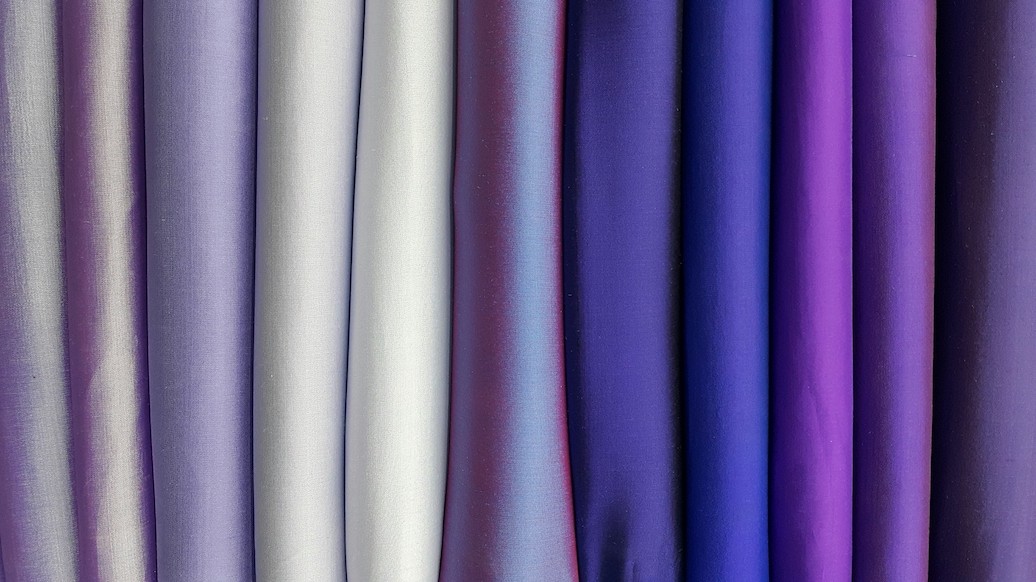
Conagen announced the successful scale-up of its sustainable, cost-effective Tyrian purple, a historically coveted and expensive dye found in rare and limited sources in marine nature.
Conagen is the world’s first and only biotechnology company commercializing a sustainable Tyrian purple by fermentation. As with any biologically-sourced textile dye, this color-fast compound reduces pollution and carbon footprints when used as an alternative to petrochemically synthesized dyes commonly used in the textiles industry today.
Also known as Phoenician purple, royal purple, imperial purple, or imperial dye, this rare dye dates back several millennia to the bronze age when the Phoenicians from Tyre, Lebanon, on the Levantine coast, produced it for the ancient Greeks, Persians, Byzantines, and the Roman empire to clad emperors and kings with luxury textiles. Tyrian purple was once worth more than its weight in gold for its prized deep rich purple. In 301 CE, during the Roman Empire, one pound of Tyrian purple dye was priced at approximately three Troy pounds of gold, roughly $66,000 in today’s currency.

Thousands of the murex sea snails are required to make 1 gram of Tyrian purple dye, which is unsustainable.
Current producers extract and harvest Tyrian purple from the murex shellfish in much the same way as the ancient Phoenicians. Thousands — approximately 10,000 or (54 kilograms (119 lb.) of these predatory sea snails are required to make diminishing quantities of Tyrian purple to produce 1 gram of the dye, making it impracticable, expensive, and environmentally unfriendly. Ancient dye producers all but drove the murex species to extinction along the coasts of Phoenicia, evident in the vast deposits of the shells excavated on the outskirts of Sidon, Tyre, and across the Mediterranean.
Bolinus brandaris, sea snail or purple dye murex
Conagen’s Tyrian purple, produced by precision fermentation and bioconversion, is a natural, sustainable dye ideal for textile companies under pressure to deliver fashions more sustainably and with a reduced global environmental footprint, especially from manufacturing.
“Conagen is democratizing the exclusive use of a color once reserved for royalty — now obtainable on a global scale,” said Casey Lippmeier, Ph.D., senior vice president of innovation. “Our fermentation and bioconversion technologies enable us to offer true-to-nature products. By leveraging Conagen’s bioengineering and commercial manufacturing capabilities, we’re unlocking Tyrian purple’s great potential as an accessible and sustainable dye. We expect Tyrian purple to inspire fresh ideas in multiple industries, making this rare and exciting color more marketable with planet-conscious consumers.”
The Tyrian purple technology is based on two of Conagen’s many key bioengineering platforms, which enable accelerated product development timelines for its competitive phenolics, terpenoids, proteins, and peptide molecules.
As an example, Conagen’s phenolics platform was used to make an important antioxidant, hydroxytyrosol, the active health ingredient found in oil, juice, and fruit in olives. Using another platform, Conagen has optimized the production of different amino acid-based products, including the nutraceutical antioxidant ergothioneine, a “longevity vitamin” currently branded as “Ergoactive” by Conagen’s pipeline partner Blue California. To produce the Tyrian purple, Conagen drew from both proprietary platforms to develop novel enzymes which increase the conversion efficiency of precursors to the dye.
Conagen aims to replace petroleum-based ingredients and reduce carbon footprints with green technologies. Tyrian purple adds to Conagen’s natural color offerings, including several carotenoids made by fermentation which have been scaled to global production. As a dye, Tyrian purple is ideal for textile fabrics, clothing, handbags, and related accessories.














